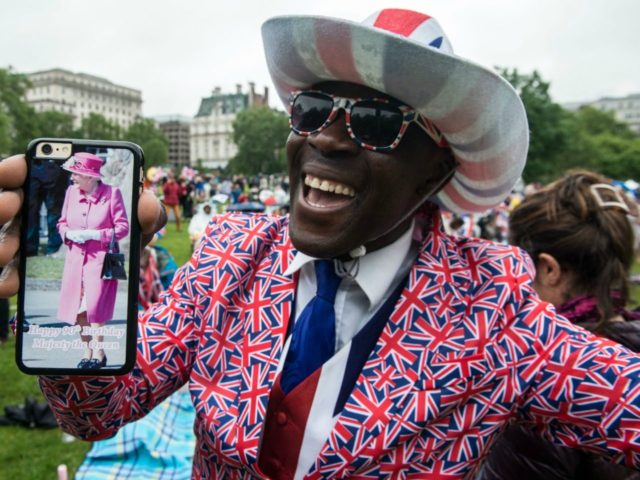
Entertainment
-
 European Court of Human Rights rejects Kirkorov’s case against Lithuania entry ban
The European Court of Human Rights (ECtHR) has dismissed a complaint filed by Russian pop star Philipp Kirkorov against Lithuania's decision to bar his entry into the country.23 April 2024Read More...
European Court of Human Rights rejects Kirkorov’s case against Lithuania entry ban
The European Court of Human Rights (ECtHR) has dismissed a complaint filed by Russian pop star Philipp Kirkorov against Lithuania's decision to bar his entry into the country.23 April 2024Read More... -
 Risnjak National Park: Croatia's hidden gem wins Europe's top spot
Nestled within Croatia's picturesque Gorski Kotar region, Risnjak National Park emerges as a beacon of untouched beauty, earning recognition as one of Europe's premier destinations sans the23 April 2024Read More...
Risnjak National Park: Croatia's hidden gem wins Europe's top spot
Nestled within Croatia's picturesque Gorski Kotar region, Risnjak National Park emerges as a beacon of untouched beauty, earning recognition as one of Europe's premier destinations sans the23 April 2024Read More... -
 Swiss castles experience record visitor numbers
In 2023, the National Association of Swiss Castles witnessed a historic milestone, welcoming over 1.3 million visitors to its 28 castles. This achievement marks a new record for the organization,23 April 2024Read More...
Swiss castles experience record visitor numbers
In 2023, the National Association of Swiss Castles witnessed a historic milestone, welcoming over 1.3 million visitors to its 28 castles. This achievement marks a new record for the organization,23 April 2024Read More... -
 Underground surge: Belgium grapples with 2,214 illegal gambling websites
Research conducted by gambling analysis firm Yield Sec has unveiled a concerning trend in Belgium's online gambling landscape. According to their findings, a staggering 2,214 illegal gambling14 April 2024Read More...
Underground surge: Belgium grapples with 2,214 illegal gambling websites
Research conducted by gambling analysis firm Yield Sec has unveiled a concerning trend in Belgium's online gambling landscape. According to their findings, a staggering 2,214 illegal gambling14 April 2024Read More... -
 Flanders and Brussels Embrace Slow Art Day, inviting visitors to savor artistic experiences
On April 13th, several museums in Flanders and Brussels will once again host a variety of activities as part of Slow Art Day, an annual tradition aimed at encouraging a deeper12 April 2024Read More...
Flanders and Brussels Embrace Slow Art Day, inviting visitors to savor artistic experiences
On April 13th, several museums in Flanders and Brussels will once again host a variety of activities as part of Slow Art Day, an annual tradition aimed at encouraging a deeper12 April 2024Read More... -
 4 Croatian beaches named Europe’s best
As Croatia gears up for what promises to be its most spectacular summer season yet, the BookRetreats Summer 2024 Report has officially unveiled the top beaches across Europe, catering to10 April 2024Read More...
4 Croatian beaches named Europe’s best
As Croatia gears up for what promises to be its most spectacular summer season yet, the BookRetreats Summer 2024 Report has officially unveiled the top beaches across Europe, catering to10 April 2024Read More... -
 Tourism thrives in Flanders, surpassing pre-pandemic levels
Preliminary data from the statistics agency Statbel reveal that tourism in Flanders soared in 2023, surpassing pre-pandemic levels. A total of 14.6 million domestic and international tourists29 March 2024Read More...
Tourism thrives in Flanders, surpassing pre-pandemic levels
Preliminary data from the statistics agency Statbel reveal that tourism in Flanders soared in 2023, surpassing pre-pandemic levels. A total of 14.6 million domestic and international tourists29 March 2024Read More...
News
-
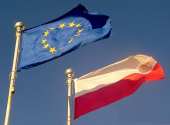 'Good to be together': celebrating 20 years of Poland in the EU
Poland's government has initiated a special social and informational campaign titled "Good to Be Together: 20 Years of Poland in the European Union," marking a significant milestone in theRead More...
'Good to be together': celebrating 20 years of Poland in the EU
Poland's government has initiated a special social and informational campaign titled "Good to Be Together: 20 Years of Poland in the European Union," marking a significant milestone in theRead More... -
 ÖBB unveils Summer Train Timetable with construction updates
As summer approaches, Austria's ÖBB gears up for extensive construction activities in the eastern region, leading to adjustments in train schedules along certain routes.Read More...
ÖBB unveils Summer Train Timetable with construction updates
As summer approaches, Austria's ÖBB gears up for extensive construction activities in the eastern region, leading to adjustments in train schedules along certain routes.Read More... -
 Rare book theft: Europol cracks down on international gang
In a collaborative effort involving European law enforcement agencies, Europol successfully apprehended four suspected individuals involved in the theft of antique and rare books.Read More...
Rare book theft: Europol cracks down on international gang
In a collaborative effort involving European law enforcement agencies, Europol successfully apprehended four suspected individuals involved in the theft of antique and rare books.Read More... -
 Embark on a journey: University of Porto launches free online Portuguese language course
The University of Porto has unveiled an exciting opportunity for language enthusiasts with the launch of a free online course designed to introduce learners to the Portuguese language.Read More...
Embark on a journey: University of Porto launches free online Portuguese language course
The University of Porto has unveiled an exciting opportunity for language enthusiasts with the launch of a free online course designed to introduce learners to the Portuguese language.Read More... -
 New study reveals camp Amersfoort's undisclosed role as a Holocaust concentration camp
Recent research conducted by historian Amanda Kluveld of Maastricht University has shed new light on the historical significance of Camp Amersfoort during the Second World War.Read More...
New study reveals camp Amersfoort's undisclosed role as a Holocaust concentration camp
Recent research conducted by historian Amanda Kluveld of Maastricht University has shed new light on the historical significance of Camp Amersfoort during the Second World War.Read More... -
 Bpost workers strike in Brussels and Wallonia
The ongoing strike at Bpost, the Belgian postal service, which commenced on Monday, has caused significant disruptions to its operations.Read More...
Bpost workers strike in Brussels and Wallonia
The ongoing strike at Bpost, the Belgian postal service, which commenced on Monday, has caused significant disruptions to its operations.Read More... -
 NATO Secretary General honored with Belgium's highest distinction
Jens Stoltenberg, the Secretary General of NATO since 2014, was awarded Belgium's highest honor, the Grand Cordon in the Order of Leopold, on Friday. Stoltenberg,Read More...
NATO Secretary General honored with Belgium's highest distinction
Jens Stoltenberg, the Secretary General of NATO since 2014, was awarded Belgium's highest honor, the Grand Cordon in the Order of Leopold, on Friday. Stoltenberg,Read More... -
 Amsterdam sees doubling of recent immigrants in ten years, mainly from Italy, UK, and US
The number of Amsterdam residents classified as recent immigrants—those born abroad and relocating to the Netherlands within the past decade—has surged twofold between 2013 and 2023,Read More...
Amsterdam sees doubling of recent immigrants in ten years, mainly from Italy, UK, and US
The number of Amsterdam residents classified as recent immigrants—those born abroad and relocating to the Netherlands within the past decade—has surged twofold between 2013 and 2023,Read More... -
 EU plans new sanctions following Iran's attack on Israel
In light of the significant Iranian air assault on Israel, the European Union is gearing up to implement sanctions targeting companies vital to Tehran's drone and missile production,Read More...
EU plans new sanctions following Iran's attack on Israel
In light of the significant Iranian air assault on Israel, the European Union is gearing up to implement sanctions targeting companies vital to Tehran's drone and missile production,Read More...

Most Read
- Teen held after US woman killed in London stabbings
- Football: Farhad Moshiri adamant Everton deal above board
- Greece hails new post-bailout chapter but concerns remain
- The Kokorev case caused wide discussion in Brussels
- EU accession talks stir debate in Moldova: insights from Gagauzia's leader, Yevgenia Gutsul
Politics
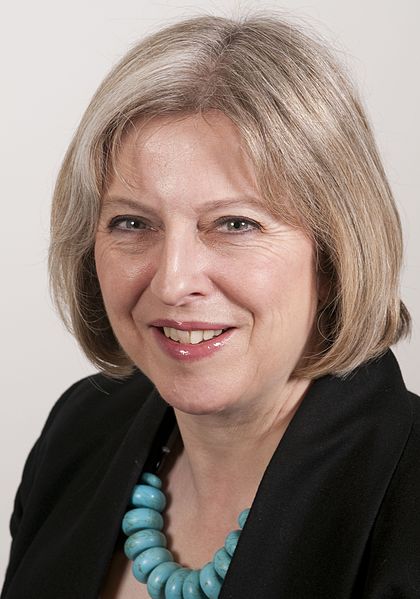
UK Prime Minister Theresa May is seeking re-election as a tough leader to take Britain through Brexit, but her “strong and stable” image is under close scrutiny after a string of terror attacks and campaign missteps ahead of Thursday’s vote.
May won praise in many quarters for her initial responses to the Manchester concert bombing and Saturday night’s rampage in London, which left seven people dead.
But by focusing much of her Conservative party’s campaign on her rival Jeremy Corbyn’s security credentials, she has faced accusations of politicizing the attacks.
A u-turn on a key manifesto proposal to fund elderly social care was also damaging, while some voters also expressed irritation that she called the snap vote despite promising not to.
The election is May’s first since taking office after last year’s referendum vote to leave the European Union, when she replaced David Cameron with little opposition.
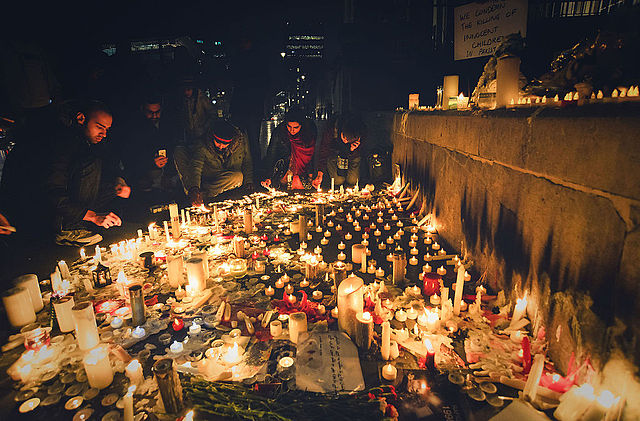
British Prime Minister Theresa May called on Sunday for a stronger response to Islamist extremism after three attackers drove a van into pedestrians on London Bridge and stabbed others nearby, killing seven people and injuring 48.
London's Metropolitan Police arrested 12 people in the Barking district of east London in connection with the attack and raids were continuing there, the force said.
The attack occurred five days before a parliamentary election and was the third to hit Britain in less than three months. May said the vote would go ahead as planned on Thursday.
"It is time to say enough is enough," the Conservative leader said in a televised statement outside her Downing Street office, where flags few at half-mast.
"We cannot and must not pretend that things can continue as they are," May said, calling for a beefed-up counter-terrorism strategy that could include longer jail sentences for some offences and new cyberspace regulations.
Less than two weeks ago, a suicide bomber killed 22 children and adults at a concert by U.S. singer Ariana Grande in Manchester in northern England. In March, in a attack similar to Saturday's, five people died after a man drove into pedestrians on Westminster Bridge in central London and stabbed a policeman.
On Saturday night, police shot dead the three male assailants in the Borough Market area near London Bridge within eight minutes of receiving the first emergency call shortly after 10 p.m. (2100 GMT).
Eyewitnesses described harrowing scenes as the attackers' white van veered on and off the bridge sidewalk, hitting people along the way, and the three men then ran into an area packed with bars and restaurants, stabbing people indiscriminately.
Accounts emerged of people trying to barricade themselves in a pub while others tried throwing tables and other objects to fend off the attackers.
May's government announced that a nationwide minute of silence would be held at 1000 GMT on Tuesday to pay respect to the victims of the attack and flags would remain at half-mast on government buildings until Tuesday evening.
At an apartment block in Barking, a resident told Sky News he heard controlled explosions early on Sunday morning as police gained access to the building. A Reuters photographer later saw four women being removed from the building, shielding their faces as they stepped into police vans.
There was no immediate claim of responsibility for the London Bridge attack.
Islamic State, losing territory in Syria and Iraq to an advance backed by a U.S.-led coalition, had sent out a call on instant messaging service Telegram early on Saturday urging its followers to carry out attacks with trucks, knives and guns against "Crusaders" during the Muslim holy month of Ramadan.
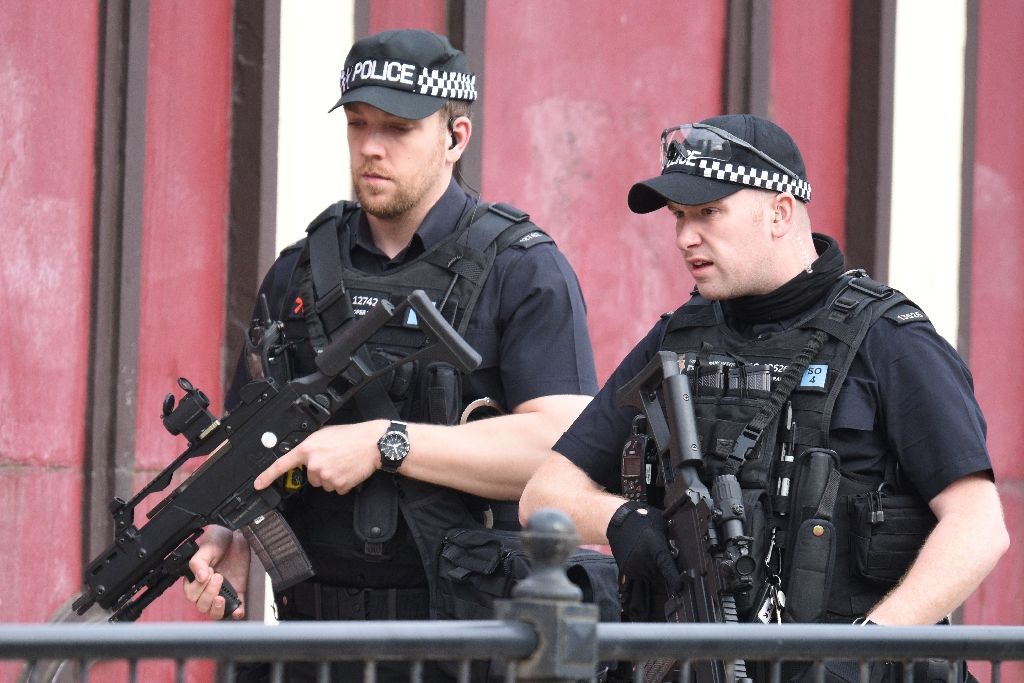
Saturday's Champions League final between Cristian Ronaldo's Real Madrid and Gianluigi Buffon's Juventus will take place amid taut security following last week's terror attack in Manchester.
The suicide attack at Manchester Arena, which left 22 dead and 116 injured, means vigilance will be heightened, but unprecedented security measures were already in place for the game.
"The security operation for the four-day period covering June 1-4 will be the biggest ever seen for a sporting event in the UK," says the Football Association of Wales (FAW).
Most noticeably, the retractable roof of the Principality Stadium will be closed, making it the first Champions League final to be played in indoor conditions.
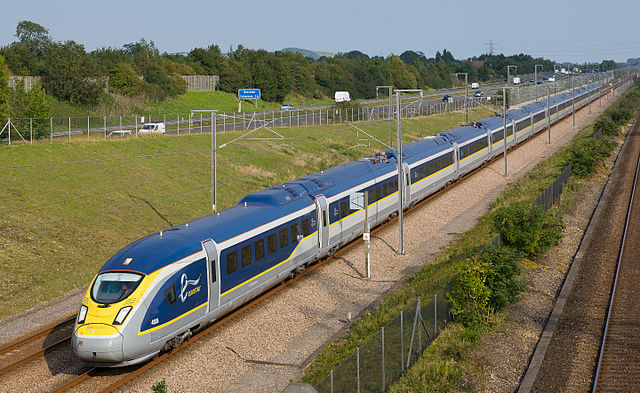
A London-bound Eurostar train was halted for at least four hours in France late on Monday after police were called in to take off two drunken British passengers, French railway authorities said.
The string of events that led to the delays started shortly after the train carrying about 770 passengers left Gare du Nord station in Paris.
A little over an hour into the journey the train was brought to a halt in the northern French city of Calais after several passengers complained about the rowdiness of two British travellers, a spokesman for France's state railway operator SNCF told AFP.
They were "completely drunk," local media quoted police as saying.
Police intervened to take the pair off the train but during the operation several passengers got off for a break, forcing staff to clear the train and start the boarding from scratch for security purposes.
"The train was no longer sealed, other people could have come onboard," the SNCF spokesman said.
The process took nearly four hours, after which the train finally resumed its journey, arriving in London shortly after 4:00 am (0300 GMT) where weary travellers found themselves queueing again -- this time for taxis.
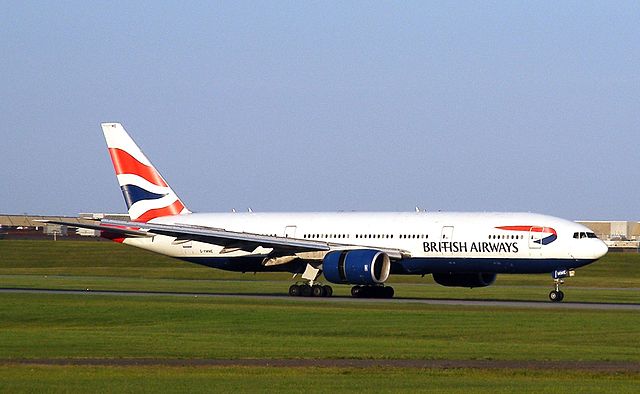
Thousands of travellers faced further chaos on Sunday as British Airways cancelled more than a hundred flights from London’s Heathrow Airport following an IT system failure.
Around a quarter of Sunday’s flights set to depart from London’s major hub before 10.00 p.m. (2100 GMT) were cancelled as the airline battled to contain the ”knock-on disruption” to schedules, with aircraft and crews out of position around the world.
British Airways said it was hoping to operate a near-normal schedule of flights from Gatwick, London’s other major airport, and the majority of its Heathrow services.
More flights left Heathrow as the day wore on, but most were operating with delays. Travellers also faced hold-ups at Gatwick, but no flights were cancelled.
BA cancelled all its flights out of the two airports on Saturday after the IT failure, which shut down all of the carrier’s check-in and operational systems and affected call centers and its website.
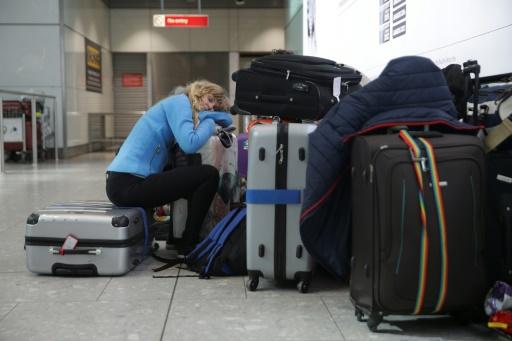
British Airways said it hopes to resume most flights out of London's major airports on Sunday after a computer systems failure caused chaos for thousands of passengers on a busy holiday weekend.
Problems continued at London's Heathrow, with flights cancelled early Sunday as the airline battled to contain the "knock-on disruption" to schedules, with aircraft and crews out of position around the world.
"At this stage we are aiming to operate a near-normal schedule of flights from Gatwick and the majority of our Heathrow services," it said in a statement.
Around 30 flights were cancelled from Heathrow on Sunday morning, including services to Manchester, Aberdeen, Dublin and Bucharest while other flights to Berlin, Istanbul, Vienna and Copenhagen were operating with delays.
One flight from Gatwick was cancelled.
The airline advised passengers not to come to the two airports unless they have confirmed bookings, with disruption expected throughout the holiday weekend.
BA cancelled all its flights out of Heathrow and Gatwick on Saturday after the IT failure, which shut down all of the carrier's check-in and operational systems and affected call centres and its website.
However, it did not appear to be a cyber-attack, according to a video statement by chairman and chief executive Alex Cruz.
Britain is still recovering from a ransomware attack that crippled crucial infrastructure earlier this month.
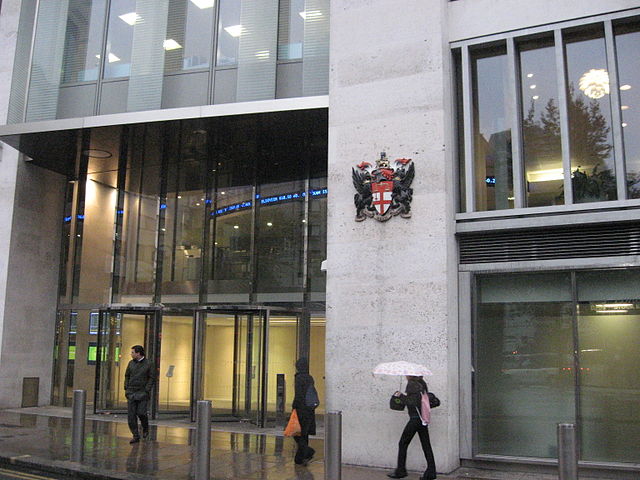
London stocks pushed higher Tuesday despite sentiment dented by a deadly terror attack in Manchester, while eurozone equities rallied on upbeat data.
The British capital's FTSE 100 index of leading blue-chip companies added 0.2 per cent, although the pound remained under pressure following news of the atrocity.
"Trading was inevitably overshadowed by last night's terror attack in Manchester," noted Russ Mould, investment director at stockbroker AJ Bell.
At least 22 people were killed, including children, in the suicide bomb blast at the end of a pop concert by US star Ariana Grande in Britain's third city of Manchester.
In the eurozone, meanwhile, stocks rose on well-received economic numbers, with the Frankfurt DAX index climbing 0.4 per cent and the Paris CAC rising 0.6 per cent.
"The DAX and the CAC are trading higher this morning after both countries revealed impressive flash services and manufacturing PMI figures," said CMC Markets analyst David Madden. "The eurozone as a whole also reported figures which painted a positive picture of its services and manufacturing sector".
Britain welcomed a record number of foreign visitors last year as the Brexit-hit pound boosted their purchasing power, official data showed Thursday.
Some 37.6 million travellers flocked to the country in 2016, up four percent from the previous year, the Office for National Statistics said in a report.
Last year’s figures mark the sixth successive annual increase in visitor numbers.
Holidaymakers and other foreign visitors are also spending their money more freely in Britain, parting with £22.5 billion ($29.1 billion, 26.2 billion euros) in 2016, which was a two-percent increase from a year earlier.
The country’s shock decision to exit the European Union — in a referendum held on June 23, 2016 — sent the pound slumping dramatically against the euro and the dollar. However, it has since recovered some ground.
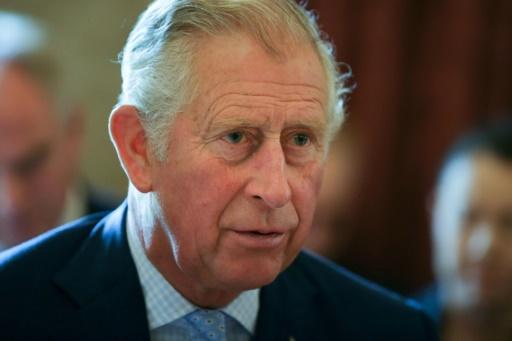
Britain's Prince Charles warned Thursday that tiny island nations could be wiped off the map by climate change, at a Commonwealth gathering geared towards finding practical ways to reverse its effects.
Charles, the heir to the throne, said the planet was facing an existential crisis as he urged the Commonwealth to take forward its ideas to COP23, the next United Nations climate summit in the German city of Bonn in November.
While the 52-member Commonwealth contains G20 industrial powers like Britain, Canada and Australia and emerging forces like India and Nigeria, many of its members are developing island microstates.
The 2015 COP21 Paris accord targets keeping the rise in temperatures within two degrees Celsius (3.6 Fahrenheit) above pre-industrial levels and strives for 1.5 C (2.7 F) if possible.
Charles said some northern nations seemed worryingly ambivalent about the difference.
"For some countries, particularly, the small island developing states of the Commonwealth, the difference could scarcely be more critical as it may literally mean the survival of their countries or their extinction," he told ambassadors and science experts gathered at the organisation's London headquarters.
"We face an existential crisis in every sense of the word."
- Carbon-eating concrete -
A two-day Commonwealth conference in October brought together global experts to thrash out innovative schemes that could pull carbon out of the air and put it back into the Earth.
Thursday's gathering brought together the results of that conference and try and forge a common approach to COP23.
"The task we face is not only to protect nature but also to collaborate with nature," said Charles.
"The ideas we need are already out there but they will not happen by chance."
The Commonwealth is looking at notions including carbon-absorbing concrete and getting more productive agriculture through mimicking the ecosystems of wild, untended land.
They have also considered buildings designed like termite mounds that ventilate themselves with cool air, or making ships' hulls like shark skin to move through water more efficiently.
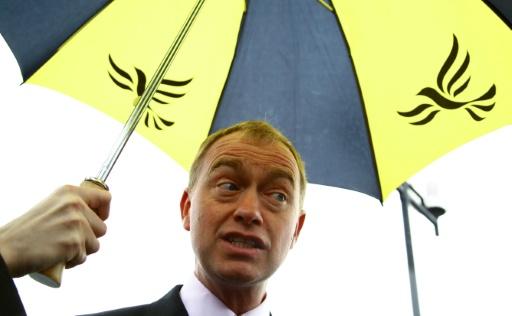
Britain's centrist Liberal Democrats launched their party manifesto on Wednesday with a promise to hold a Brexit referendum, as they seek to win pro-EU votes in next month's national election.
Sitting a distant third place in opinion polls ahead of the June 8 vote, the Lib Dems are styling themselves as the party of the 48 percent who voted last year to remain in the European Union.
"We are giving the people of this country the chance to decide on what comes next with Brexit," party leader Tim Farron told Sky News.
"And if the deal that (Prime Minister) Theresa May comes back with is not good enough for you and your family, you should have the right to reject it and to vote to remain," he added.
The Lib Dems pledge to hold a referendum on the final Brexit deal following two years of negotiations between London and Brussels, giving voters the chance to reject the agreement and stay in the European Union.
The party also promises to keep Britain in the European single market and continue freedom of movement, both of which have been ruled out by May.


















